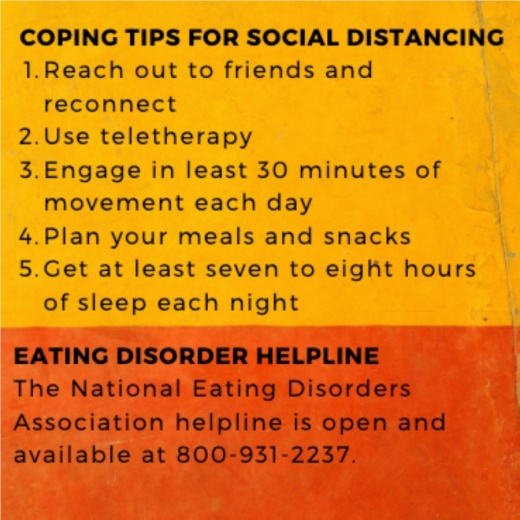"COVID-19 and quarantining is triggering a lot of people to over focus on their body and health because they have more time," Sechi said. "This makes eating disorders even worse."
Wellness Coaching and Nutrition Therapy provides wellness coaching, nutrition therapy services and helps modify behaviors around nutrition and exercise.
Current challenges related to the global pandemic and those with eating disorders include individuals being at home all day surrounded by food, disrupted daily routines, limited human interaction for support, and triggering images and messages on social media.
The following Q&A includes information on eating disorders and tips from Sechi to help struggling individuals get through this period of isolation. Some answers were shortened for length and clarity.
What are some tips to maintain a healthy lifestyle while quarantined/social distancing?
Try not to go more than five hours without eating. Eating gets really way off being off of a schedule, and that can really cause mood to get unregulated, anxiety to increase, and even depression and things like that. If you look at the general guidelines, they suggest you to get around 150 minutes of movement in during the week. Even just getting some gentle movement every day through playing with your kids or taking a nice walk with your dog is excellent. That's really helpful for the heart and general mental health. If you are working from home, taking 10-minute breaks and just getting outside and walking a little bit, doing yoga or stretching can be helpful. Another aspect of self-care is sleep. I would encourage people to get between seven and eight hours of sleep every day. There is so much brain repair that happens at night and watching TV all throughout the night or watching pretty stressful stuff before you go to bed really can disrupt sleep. It's really easy for people to get focused on the news and just that worry that is there.
What is the best way to manage snacking and eating at home during a unique situation where households are stocking up on food and humans are likely experiencing more anxiety, stress and boredom?
There is going to be a lot more grazing, which is unintentional snacking. Oftentimes, grazing is driven by emotions, and this is a highly emotional time. There is a lot of grieving, fear of change in our environments, and fear of loss of jobs. Those emotions are escalating and many people cope with them through food because it is very calming to the brain and in a way it is distracting from these stressors. A lot of this situation causes what we call a sense of deprivation. In my context of working with those with eating disorders, dieting is one of the number one ways to develop an eating disorder. Deprivation is such a big factor because our bodies are so amazing that if your brain and your thoughts are thinking you don't have enough food and fuel, it forces you to overeat or constantly eat as a source for extra fuel. We have seen the results of this sense of deprivation at our grocery stores in the last few weeks. But when there is a lot of food, one thing that helps is to have structure to your day. Make sure you have planned meals and snacks. We need to make sure our biology works for us and not against us.
Do you have any advice for those who are not in the midst of an eating disorder but perhaps have a history of anorexia, bulimia or binge eating, to keep from relapsing?
For someone who has been stabilized for a while, this situation is what we call triggering. Eating disorder behaviors are a coping mechanism for major stress and anxiety and things like that, so my first suggestion is to reconnect with previous treatment teams. Work with a dietician, therapist or psychiatrist. Most are doing tele-help to support those who need it. Relationships replace eating disorders. This is a super isolate time and humans are not meant to be living alone. We are meant to connect with one another. Maybe some people are single and forced to social distance alone and others may be with their family but aren't connected very well. I would suggest reaching out to friends to FaceTime and re-connect. People tend to rely on their eating disorder to be their best friend. It's always there, it never talks back and it is a support mechanism. If someone is trying to prevent that relapse, they have to replace the eating disorder with human connection. Dogs help, too.
Is it possible to go in the opposite direction, and for people to focus on exercise too much, as opposed to food, while social distancing?
I see that often. Some people throw up, some people use exercise, diet pills or laxatives to get rid of calories so we have to kind of be careful and attentive. Even if someone with bulimia, for example, is not actively throwing up, sometimes people exercise five hours a day to burn calories. If someone is not purging, restricting their food or binge eating, and they really haven't worked on core issues and developed healthier coping mechanisms, it is really easy to fall into another maladaptive coping mechanisms. That would include over-exercise, drugs and alcohol and over-watching TV. Eating disorder behaviors are an illogical way of coping with very logical things, so it becomes a maladaptive coping mechanism. That is when people usually need to have a treatment team to support them a little bit and help them figure out other coping mechanisms to add on to eating and exercising well.





